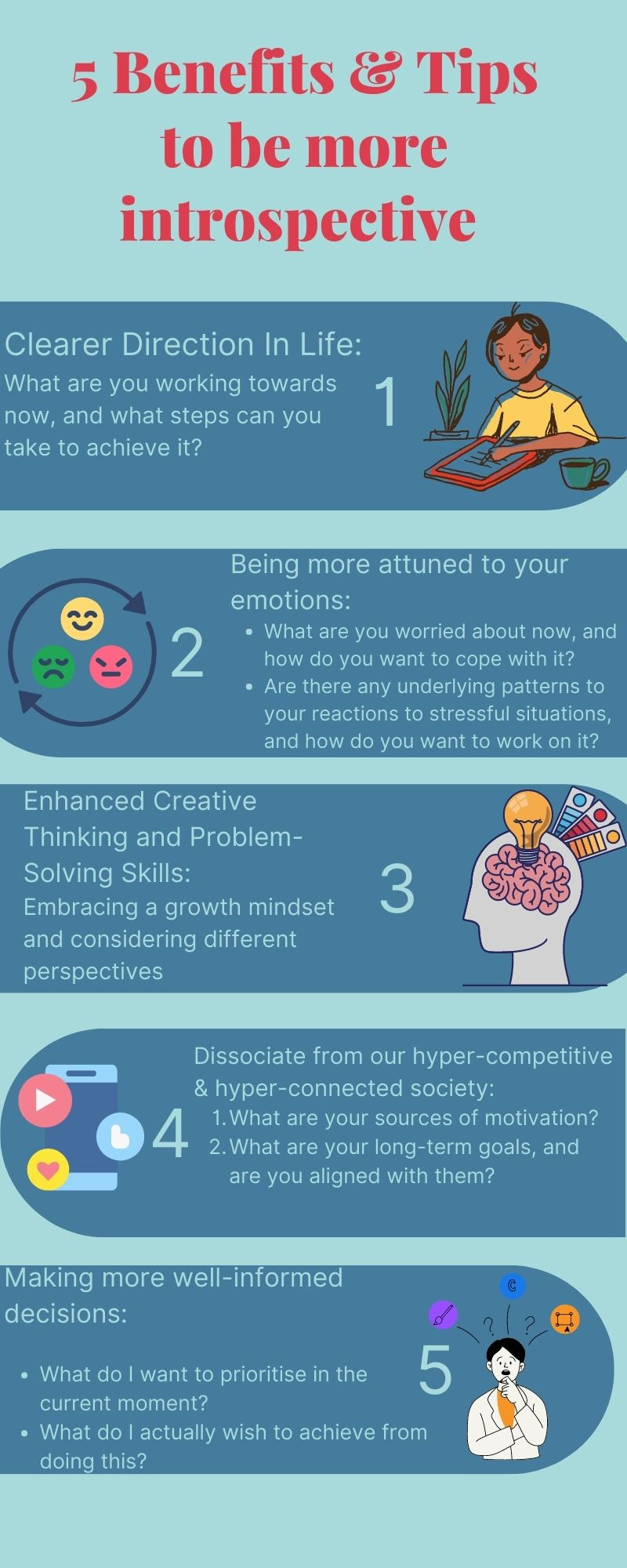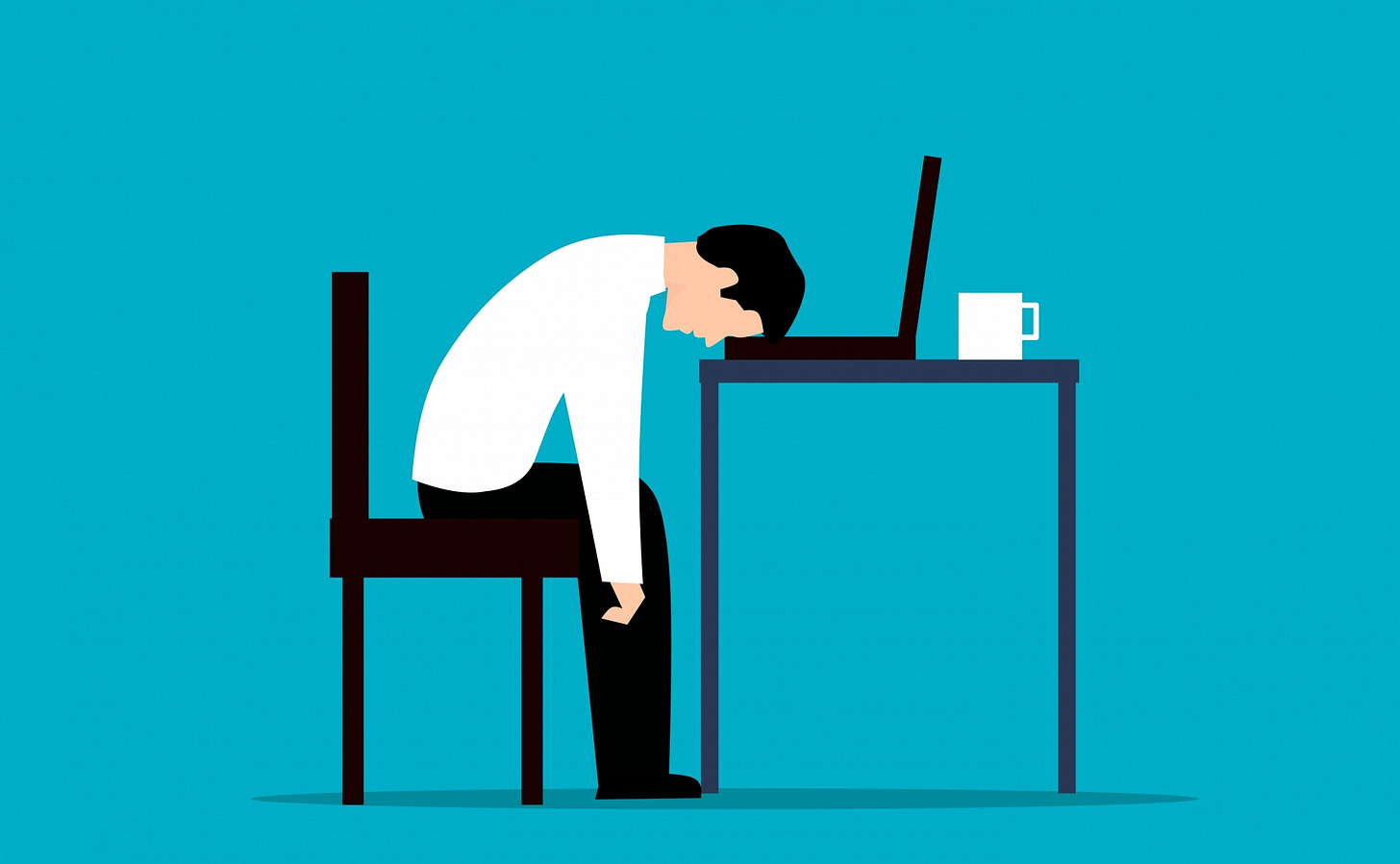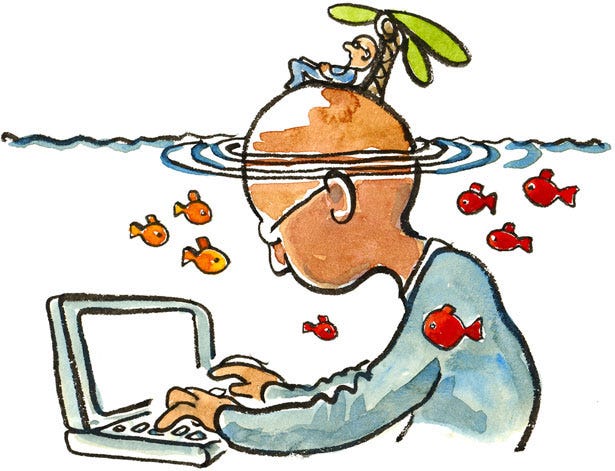5 Benefits from being more introspective (& 5 Tips to do so!)
How & Why Should We Be More Introspective?
In this day and age, we can find ourselves feeling rather overwhelmed and out of touch with our identities and our mental well-being. Hence, I shall explore the merits of being more introspective, and provide a few tips to inculcate a habit of introspection, towards living a more fulfilling, authentic life.
Read on to find out more!
Table of Contents:
5 Benefits from being more introspective
Clearer Direction In Life
As we find ourselves stumbling through life, juggling different commitments in our academic & extracurricular endeavours, it helps to take some time to reevaluate what our priorities are, and how we can fit them to achieve long term goals in the future.
Simply put, our own personal growth stories are unique to each and every one of us, and we all are on our own trajectories, having different definitions of success, paving out new roads as we explore life. As we chart our personal growth, we may find ourselves more aware of our merits and shortcomings, and from there we can seek greater meaning in the things we do, and the things we set out to achieve, giving us a clearer direction in life, which can directly/indirectly contribute to us having a greater sense of fulfilment in life.
One of the questions we can ask ourselves is: What am I working towards now, and what steps can I take to achieve it?
Being more attuned to your emotions
We all start off young and naive, clueless about many things. As we go through different stages of life, we will explore new experiences that can be accompanied by emotions that we may not be able to internalise and understand. It could be a lingering sense of disappointment from losing a close friend, a melancholic & bittersweet feeling as a chapter of your life draws to a close, and many more. Through introspection, we can identify potential stressors, and develop strong coping/defence mechanisms against these triggers.
Being introspective also has benefits in enabling us to reach into the deep recess of our mind - perhaps to identify our subconscious bias, weed out unhealthy habits to deal with external triggers. By coming to terms with our fleeting emotions, without putting in too much emphasis on rationalising it and coming to a hasty conclusion or justification of why we are feeling what we are feeling, it could bring us to another level of self-acceptance. We might be better able to embrace the concept of impermanence - where our realities and perspectives are only temporary, and ever changing - and to let go of our need for control. By trying to understand our emotions more, we can also become more attuned to the emotions of others, which can allow us to be more empathetic and compassionate to the plight of others.
What we can ask ourselves is:
What am I worried about now, and how do I want to cope with it?
Are there any underlying patterns to my reactions to stressful situations, and how do I want to work on it?
Enhanced Creative Thinking and Problem-Solving Skills
Introspection is also a tool for us to enhance our creative thinking. By looking inwards and encouraging ourselves to deeply explore our thoughts, ideas and emotions, we can promote a higher level of creativity and innovative thinking. Coupled with a humble and eager learning attitude, we can be able to appreciate different perspectives, generate more insightful and novel ideas, overcome mental blocks we might have had, all of which can foster enhanced creative thinking and problem-solving skills.
Dissociate from our hyper-competitive & hyper-connected society
Comparison is the root cause of all evil ~ Haresh Sippy
As products of our environment, we may unknowingly find ourselves caught in the constant rat race towards attainment, surrounded by different pressures in life - self-inflicted, peer & familial, and even societal pressures - overwhelmed by external stimuli and the stresses of daily life. Time goes by in a blur, and we might find ourselves disillusioned, burnt-out, physically and mentally trapped within the constraints set by ourselves. In this pressure-cooker system, within our education system & corporate workforce, it is essential to find time to de-stress and question our motives, our drive and our goals in this fast paced society.
I am aware that it can be quite pretentious of me to make this assumption that people have sufficient/adequate time (given that I am still quite sheltered from the realities of the working world) to prioritise self-reflection, but I believe that it is integral to set aside time even with busy lifestyles.
With the digitisation of our lives and the want to ride the waves of social media, the more interconnected our world and social circles might be, the more distant we might become with our true authentic self. Embracing our rich inner world gives us the much needed time for digital detoxification, and we can spend time identifying how we interact with our surroundings - and learning to dissociate ourselves occasionally to bring focus to our inner world.
We can become happier, more content with ourselves - to be able to count our blessings and to live with gratitude. We may find contentment in solitude, and not suffer from FOMO (fear of missing out) all the time.
You could try asking yourself:
What are my sources of motivation?
What are my long-term goals, and am I aligned with them?
Making more well-informed decisions
Being introspective also has benefits in enabling us to reach into the deep recess of our mind, assessing and weighing pros and cons. Being introspective allows you to be tastefully self-serving, by analysing how the decisions you make will have an impact on yourself - currently and maybe even in the future. By peeling away the outer layers of superficiality and identifying how some decisions you make might place too much emphasis on the potential reactions/ridicule of others, we can free ourselves from succumbing to too much external pressure. As we humans are hardwired to seek pleasure and avoid suffering, by spending time to look within ourselves, we can conceptualise and make decisions that can reap long-term benefits and embrace delayed gratification.
However, it is not to say that there is any caveat to this. Sometimes, by deliberating too long on making decisions, we can become demoralised, or even discourage ourselves from taking action when your subconscious bias/fears start to kick in. Hence, it is important to ensure that making well-informed decisions shouldn’t come at the expense of being more indecisive.
Personally, I think that it depends on what your priorities and outcomes are from making this decision. Is it something that will weigh heavily on your future or is it something that works to satisfy short term goals?
I think that it is wise to think more carefully and ponder on some decisions, but introducing some spontaneity into our lives can add a little more colour and joy as well.
Questions:
What do I want to prioritise in the current moment?
What do I actually wish to achieve from doing this?
Does it spark joy? 😛~ Marie Kondo
Some naysayers might argue that if we spend too much time living in our own heads, when do we have time to experience the real world and live our lives to the fullest?
This begs the question: How can we have a healthy dose of introspection in our daily lives, in a way that does not interfere with our busy lifestyles?
5 Tips to be more introspective
Here, I shall be sharing 5 tips which I personally use for introspection:
Having a private space to share about your own thoughts, feelings, aspirations
This was a tip that one of my friends shared with me a few years back, and I have been using it ever since.
It can be a digital space that you have:
An anonymous account and digital space, like writing down your reflections for the day in a private account on Instagram, your sudden sparks and thoughts you had in an online document like Google Docs. It can be a youtube channel, a podcast, and so much more - just be aware of the implications of privacy
It can also be in the form of a physical space: A diary, a quiet room or your favourite place where you can get a peace of mind listening intently to your own thoughts (park)
Low commitment - When approaching the habit/idea of being introspective, it shouldn’t be treated as a chore, or a task on a to-do-list. It can be done (and should be, in my opinion) as a stepping stone for self-improvement, as a new outlet to express your feelings and air out your dirty laundry (concerns), then to carefully consider how you can learn & grow from it.
Ad-hoc basis → During more stressful periods of my life, I used it more often to slow down the pace, and to be more mindful of my incessant urge to rush and worry. It helps to clear your mind by verbalising/expressing your thoughts.
A mindfulness walk
Put on some peaceful, calming music (or just focus on the tranquillity of the night), and take some time to recalibrate your thoughts. Let yourself be lost in your own thoughts, allow yourself to do some mental decluttering, and bring your attention to your senses, or just observe the surroundings. As you calm your nerves, and look at things from a bigger picture/macro perspective, you might gain fresh insights on solutions into problems that have been troubling you.
It doesn’t have to be every night, or every morning, just do it at your own comfortable pace, see if it helps!
Meditation
I think what many people might struggle with is that we might not see evident benefits from meditation. From my personal experience, it is less enjoyable when it becomes a chore. Just like how introspection should be something done willingly, meditation is something that I like to experiment with. We can practice drawing our attention to our inner selves, meditate to quieten the loud noises, the incessant worrying and nagging at the back of your head. Meditation can also help us to practice mindfulness, serve as a method for de-stressing for some and also as a morning/before bed routine, etc.
Spend Less Time on Social Media
I find that more often than not, a huge proportion of our energy is invested into social media, and this leaves us mentally drained when it comes to understanding and delving deep into our rich inner souls.
This is not to say that we should, or must completely erase social media from our lives, (especially since it is a platform for many to connect with one another, or even a source of income/livelihood for some) but I do see some merits in setting some boundaries for ourselves, to have protected time to recharge and regain some sort of balance in our lives.
What we can do is to, for example:
Track the amount of time we spend on our mobile devices
Set time limits that (unless you wish to undergo a cold turkey treatment) are sustainable for the different social media platforms on our mobile phones.
Practise active listening
I find that by actively listening to others with the intent to understand (and not with the intent to reply/chime in), we can not only learn more about them as we encourage openness and honesty, we can also be able to gain insights into our own lives, as we learn to be more open with ourselves. As you converse about topics that are close to their hearts (their ambitions, priorities, desires and worries about the past, present and future), you may find yourself thinking more deeply about your own personal life, engaging in self-reflection and introspection more. As we learn to objectively listen to others, we can also grow our emotional intelligence.
Putting Aside Our Inherent Bias
While being introspective might benefit some, others might find it to be debilitating, resulting in adverse effects that defeat the purpose of introspection in the first place. We might enter headfirst with the assumption that introspection is the gold standard for self-awareness, and how tuning in to your personal thoughts and feelings is the key to blocking out the external noises so that you can get rid of distractions to embrace a growth mindset.
However, it can quickly devolve into blind delusion. Introspecting, in an excessive form, can cause us to dwell on and even rationalise our mistakes, trying to find possible explanations for everything we are feeling (especially negative emotions and thoughts), which can very easily turn into something that reinforces personal biases.
Just imagine a group of yes-man in your head justifying your actions constantly, feeding you the same reasons repeatedly (how we can subconsciously/unintentionally narrow down our perspectives. This echo-chamber might result in us more likely to develop a confirmation bias and thus be unable to adopt an open mind to different perspectives.
As we all have our own narratives, and our inherent bias towards ourselves, we might overlook some of our blind spots, which is why it is also crucial to not only be introspective but only to be receptive to feedback from others.
Sometimes, looking deep into ourselves can result in overthinking, rumination, self-criticism if not done in a constructive manner: we may end up spiralling into negative self-thought, or wallow in self-pity. When you excessively introspect to the point of overthinking and overanalysing everything, it paradoxically diminishes our quality and amount of time available to actually live your life.
Therefore, I believe that it is integral to be self-aware about why and what you introspect about. With practice, we can identify when our self-thoughts are veering towards being detrimental to our well-being, and redirect our focus into asking ourselves forward-thinking questions - questions that help us to objectively assess our actions and rectify them, questions that serve us by encouraging self-improvement.
Refining My Relationship with Introspection
As I focused more on looking within, it gave me the realisation that at this stage, I wanted to continuously work on improving myself. It brought to my attention my interest in penning down my thoughts more, and highlighted some unhealthy habits that I have with worrying about the future.
Becoming more productive
When I was stuck in a rut, and carelessly wasting my time away not doing anything productive or meaningful, I sat down and pondered deeply about how I wanted to treasure the time I had before starting a new phase of my life (university). Perhaps, it was also due to boredom that inspiration came by, but I do also attribute some of my motivation to start taking action to my introspective episodes.
Time Blocking To Boost Productivity
I believe that us humans are habitual creatures, and making small micro-steps to incorporate routines in our daily lives can actually make it easier for us if we wish to establish long-term goals. Very often, we may suffer the illusion of choice when idling at home, and having the preconception of an abundance/excess of time in our hands, and we end up…
Becoming more open with my thoughts and my ideas
As I navigated through and made myself more aware of how much I worry, about fear of rejection and fear of embarrassment from sharing something that people might perceive as stupid. Honestly, I think many of us are our own harshest critics, and we can all be kinder to ourselves to grow and improve.
Becoming more open to try new challenges
Constant worrying and negative self-talk actually made me lose out on a lot of opportunities (for example, I would worry about not being able to cope with academics, and thus give up on a lot of opportunities to interact with people, explore different interests, which did serve me well). Thus, seeking out the uncomfortable truth of my irrational fears and facing them helped me to gain more courage in stepping out of my comfort zone more.
Concluding Thoughts
All in all, I believe that having an intricate balance in self-awareness, coupled with humility and willingness to accept constructive criticism from others, is key to grow and improve.
Most of the tips that I share here are things I have experimented with, with varying degrees of success, but I guess it is okay for it to be a work in progress, and we can’t expect miracles to happen overnight. That being said, feel free to comment on your experiences in your introspective journey, and do share this if you found it insightful.
Happy Reading ~
















